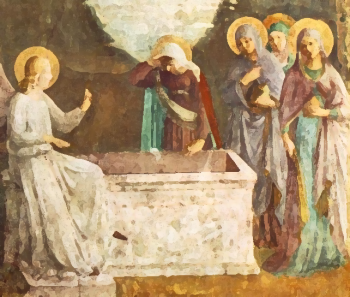
WHAT?
I was a little shocked when I re-read the Gospels for the first time as an adult. Wait a minute…really? Do we believe that really happened?
Miracles seem natural to children. The miraculous is everywhere. Picture books have miraculous endings. Myths have heroes undertaking heroic adventure. Miraculous beasts bring fantasy to life. Miraculous inventions are the stuff of science fiction. So, it came as no surprise that miracles punctuate the Bible stories we read as children in Sunday School.
But when I re-read the four Gospels as a serious adult, I was momentarily taken aback. I was prepared to love God with all my heart, love my neighbor as myself, and accept the contributions that the beatitudes make to a life well lived. But what about healing the sick with a simple touch and calling Lazarus back from the dead? What about the resurrection? As a rational and responsible adult, I wondered if accepting miracles now would be a return to childish imagining. Was it possible to love God and Jesus and your neighbor without having to weigh-in on the miracles?
Where’s the science?
I thoroughly enjoyed all the science courses I took in college and know what the scientific method is. I still love theoretical physics and cosmology. I’ve personally benefited from advances in medical science and members of my family have Masters of Science degrees. I’m all in for science (although I know enough not to have blind faith in science.)
So, as I began to re-encounter miracles when reading scripture aloud in church as an adult, I could no longer just recite the narrative without thinking. I had questions. Did I really believe that happened? Was I being disingenuous as a reader if I had any doubts? Did I risk betraying my rational instincts and alienating myself from family, friends and colleagues if I did believe in miracles?
How was I to reconcile my faith with my experience and understanding (and love) of how the physical world we live in actually works?
Which side are you on?
I know there are many who believe that if you don’t accept each and every miracle exactly as described in the Gospels, then you can’t be a Christian. But I also know that such an absolute position causes many others to reject and walk away from the Bible, and miss out on everything else that is absolutely good about the Bible. Creating such a test and demanding that everyone pick a side, all-or-nothing, is hardly inviting and offers those without faith an easy out. That troubled me as a Lay Reader. I want to be able to read the Gospel with unwavering conviction and I want everyone to be able to listen and hear the Gospel whether they believe in miracles or not (yet.)
What I have come to understand as a Lay Reader is that we don’t have to force a choice. We can accommodate those who joyfully accept miracles at face value and those who need to believe that there’s a real world (possible) explanation for everything that happens. And I have come to believe that such an accommodation is not a compromise in either direction.
Scholars and clergy are given the often-difficult task of discerning, establishing and maintaining church doctrine. Readers are offered a different opportunity. As a reader, I want those listening to experience the miraculous and I do not want skeptics – those doubting Thomas’ – to think for a minute that if you don’t believe in miracles you can’t or don’t need to read the Bible.
The transformative power of miracles
Now, when I encounter a miracle as I read scripture aloud in church, I accept unquestioning that SOMETHING happened. Something exceptional happened that had a profound effect on all of those who were present. SOMETHING momentous happened that defied rational description. It could only be described by those who witnessed it as a miracle. Even we today are at a loss to explain what happened. And I accept that whatever happened and however it happened, it caused a miraculous transformation.
This can be expressed in rational terms:
Miracles = The exercise of transformative power
It should be easy for anyone who pays attention to current developments in modern science to accept that forces exist outside of our current understanding of the laws of physics, biology and chemistry. There are forces that lie far beyond the reach of our five senses and the limits of our technology. Dark energy is just one example in modern physics. Dark energy is a conjecture but we have little to no understanding of what it is and how it works. Consciousness and life itself are similar mysteries for biologists.
If we can accept that such forces exist, I think it’s just as easy to accept that Jesus could have had access to powers unknown to other men and women in ancient Judea: transformative powers that seemed to everyone else like miracles. And the power that Jesus had to transform the experiences of those he came into contact with is impossible to deny.
Jesus relied on miracles to get people’s attention and parables to spread the Gospel. Miracles are quick and high energy. They highlight the extraordinary nature of what is taking place. They signal that Jesus is operating on different plane. He demonstrates that it’s possible to change the inertia of something…he offers an indication of what it’s like to challenge the second law of thermodynamics. Miracles command and focus attention and get people talking. They worked then and they continue to work today.
But as Jesus says repeatedly, it’s your faith that has made you well not the miracle. It’s faith that matters more than miracles. As such, miracles are necessary. But what’s most meaningful for readers are not the details of what and how it happened. What matters most is not what it means from a theological or doctrinal perspective. What matters most is the experience and response of those present. I may not know exactly what happened or how it happened, but I do know that something extraordinary happened. I know that God moves in mysterious ways and that those present experienced an extraordinary change in their inertia and discovered faith.
What we’re called to do as readers
As readers, what’s most important is to impart to the listening congregation what it’s like to experience what seems like a miracle.
Whether or not any of the miracles were “facts” is a scientific test that is largely irrelevant. What I find most mysterious and engaging is the realization that the more you believe it doesn’t matter whether it was in fact a miracle or not, the easier it is to accept that miracles in fact can happen. Jesus had the power to upset the natural order of the universe. And as readers, that’s all we need to know. It was the results that were truly miraculous.

